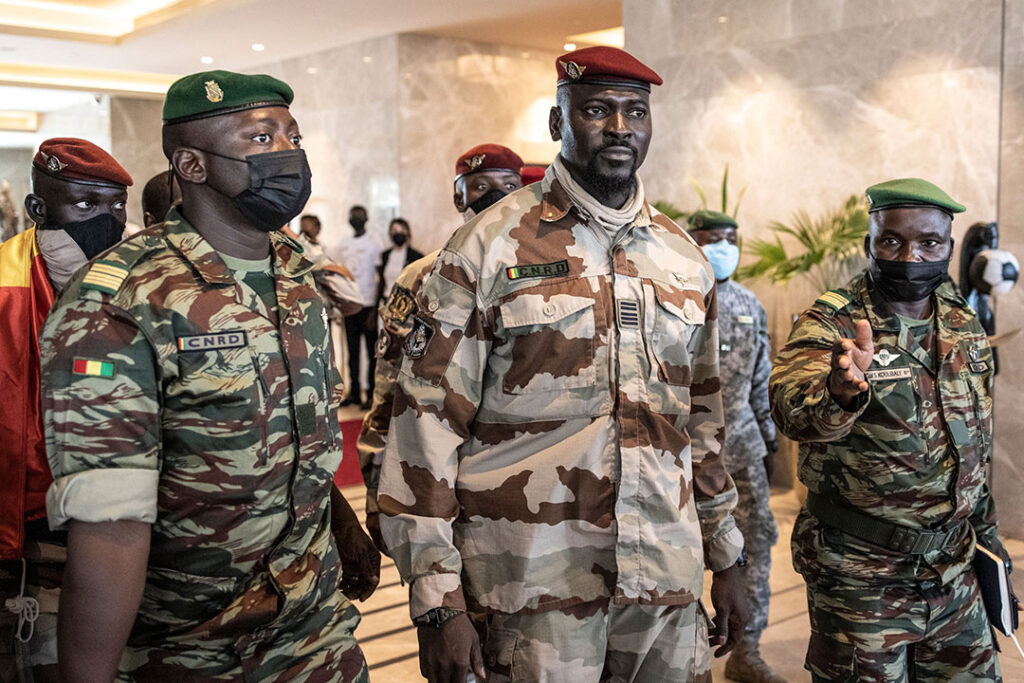ADF STAFF
The news that a junta had overthrown Burkinabe President Roch Marc Christian Kaboré, the only democratically elected head of state in the country’s history, had a familiar ring to it.
It was the fourth successful military coup in West Africa in the last 18 months, following Mali in August 2020 and May 2021 and Guinea in September 2021.
On a continent that has had 11 coups in the past decade and at least 20 attempted coups, West Africa stands out for its recent upheaval.
The question is why?
Each coup has distinct differences while also being connected, said Paul Melly, who studies the Sahel as a consulting fellow for Chatham House’s Africa program.
“As one coup has succeeded another, this has generated a broader sense of destabilization,” he told Quartz Africa magazine. “Soldiers contemplating putsch attempts may increasingly feel empowered to do so.”
Since it became an independent nation, succession in Mali has mostly come via coup d’etat. Prolonged protests over insecurity in Mali led to the ouster of its most recently elected president, Ibrahim Boubacar Keïta. There were 11 deaths and 124 injuries reported during the protests.
Public complaints included government corruption, failure to protect citizens from the ongoing violent Islamist insurgency, and the COVID-19 pandemic, which sent an already struggling economy into a deeper downward spiral.
Guinean President Alpha Condé, the country’s first democratically elected president, won reelection in October 2020, but there were protests when he changed the constitution to enable his pursuit of a third term at the age of 83.
Burkina Faso experienced a wave of protests after a spate of deadly attacks by terrorists spilling into the country from the north.
Gilles Yabi, president of Senegal-based think tank WATHI, said the overall message is that people are fed up and want results from their governments.
“There is certainly a trend of democratic regression in the region,” he told Deutsche Welle television. “What the countries of the region need is not only elections, not only democracy, but also states that work for the interests of the people.”
Each West African coup underscores the myriad reasons for regional unrest.
Populations lose faith in governments when they manipulate the democratic process and are unable to address poverty or defend citizens from violence.
The lack of success in fighting terror groups by Sahelian and international forces has led to many protests in the region.
Lashing out at France and Europe was to be expected, said Andrew Lebovich, a Sahel expert and policy fellow at the European Council on Foreign Relations.
“As people have grown concerned and frustrated with the security situation, that blame has fallen unfairly or not on the traditional partners, on the current partners,” he told Voice of America in January.
Other experts connect the spate of coups to a lack of free and fair elections.
Former Somali President Hassan Sheikh Mohamud, who lost in 2017 to Mohamed Abdullahi Mohamed, known as Farmaajo, links coups to countries he says are missing “election integrity.”
“The military coups in three West African countries is an indicator [of] leadership failure to fix electoral malpractices,” he recently tweeted as a warning to his own country, which has struggled to complete elections since last year.
In West Africa, the Economic Community for West African States (ECOWAS) and the African Union have shouldered some of the blame despite their stance against coups.
Bankole Adeoye, AU commissioner for political affairs, peace and security, recently asserted a “zero tolerance” approach.
“Military coup is totally unacceptable,” he said. “The African Union can’t tolerate power from the barrel of guns.”
Critics have said that although these bodies are quick to suspend members when coups occur, they do little to address leaders who overstay their terms or hold sham elections.
At a September 2021 meeting of ECOWAS heads of state and governments to discuss Guinea, Liberian President George Weah posited a link between coups and a disregard for constitutional term limits.
“Is it possible that there could be a correlation between these events and the political situations where constitutions are amended by incumbents to remove term limits through referendums? Or could this be a mere coincidence?” he asked.
“If the removal of term limits is serving as a trigger for the overthrow of constitutionally elected governments, then perhaps we in ECOWAS should exert our best efforts to ensure that the term limits in the constitutions of all member states should be respected.”
In January 2022, ECOWAS slapped Mali with harsh economic sanctions over the junta’s perpetually delayed election plans, but the penalties did not deter the military takeover in Burkina Faso.
Instead, say observers, the Burkina Faso coup should be a wake-up call to the regional bloc that it needs to act more forcefully to defend democracy in West Africa.
“As long as they are not going to offer adequate responses to the governance deficit, coups are going to multiply,” Abdoulaye Barry, a Burkinabe researcher at the United Nations University for Peace, told Reuters news service.

